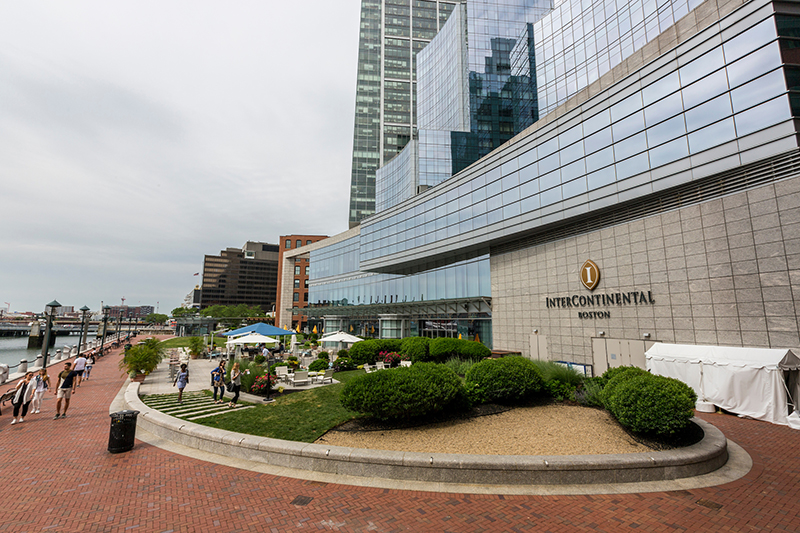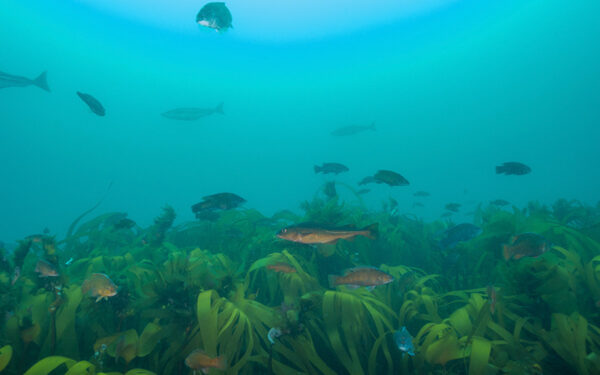
The Boston InterContinental Hotel's outdoor green space is open to the public.
The conversation around public access and rampant development along the Boston Harbor is heating up. But some waterfront properties seem a little confused about the rules for public access – for existing establishments and for the many new projects popping up.
Here’s why this matters: Much of the land in the Seaport District is subject to state regulations governing the use of tidelands. Essentially, the waterfront land on which private developments are built is “on loan” from the state: developers are allowed to site projects in these prime locations as long as their project serves a “proper public purpose.”
Here’s why else this matters: The people of Boston and Massachusetts paid to clean up Boston Harbor – and our tax dollars and water bills make sure the Harbor remains clean. State regulations make it clear that we all have a right to enjoy the fruits of this success. Boston Harbor is truly the People’s Harbor. It should not be walled off for only the wealthy to enjoy – yet we’re worried that that is exactly what is happening in the current development drive, especially in the Seaport district.
We at CLF know the laws on the books, and we know firsthand the long history of the harbor cleanup. But we had questions: Are the staff of establishments located on on the Harborwalk educated about the requirements for public access, and do they comply with them? Would we feel welcome in places designated for the public? Do the people of Boston even know how much of the harbor is open for their enjoyment?
Showing Up
We figured the best way to get answers was to show up. On a recent Friday evening, CLF president Brad Campbell and more than 40 others from across Boston gathered on the lawn at the InterContinental Hotel – a public space that the hotel has regularly rented out for $2,000 a pop. The hotel also operates a bar in publicly designated space, which appears closed off to nonresidents/hotel guests. In July, we sent a letter to the Massachusetts Department of Environmental Protection (DEP) about this, but when we showed up, it wasn’t showing any signs of closing. (Update: As of August 23, the hotel claims it has made accommodations for this.)
After leaving the InterContinental Hotel, we dropped by Fan Pier Park. This is one of the newer green spaces along the Harborwalk. It was beautiful and offered the most amazing views of the skyline. I couldn’t believe I’d never been there before! But situated as it was between an upscale new condo complex and the water, it had the feel of being a private lawn – as though if I went back without a group, I may feel out of place or even asked to leave.
After taking in the views, we continued on to another newer public space, the Public Green at Fan Pier Park, located further along the Harborwalk toward the Institute for Contemporary Art (ICA). Perhaps the area does have signs describing it as a public space, but I’ve never seen them. In fact, I’ve walked by the Green no less than a half dozen times wondering to myself: “What are they putting in this space? It’s been empty for a while!” I’d (sadly) assumed that it was meant for a commercial purpose, not as a hangout area for people like me.
Encountering Closure
And though we hadn’t undertaken our tour of public spaces along the waterfront in an act of civil disobedience, but one of civil obedience, we did encounter more confusion at our last stop, the ICA. The Harborwalk here offers not only picturesque views, but is an important throughway for commuters and cyclists.
On this evening, however, the Harborwalk in front of the ICA was closed off. The museum was hosting a ticketed “First Fridays” social event. On a beautiful Friday night in the summer, it’s natural that the museum would want to take advantage of the Harborwalk and its views – but the museum hadn’t received permission from the Massachusetts DEP to close it for a private event.
In this video, Director of Environmental Planning Deanna Moran gives an account of the experience.
An Asset for All
The Harbor has been a public asset and has shaped Boston’s development for centuries. But even so, there are still people in Boston – especially those who live in neighborhoods further from the city center – who have never even been to the harbor.
but we all paid for it. And we all fought for it. The People’s Harbor belongs to all of us. Conservation Law Foundation is committed to preserving this progress and connecting new generations of Bostonians with their harbor.
That’s why Pitch A Blanket Day was an eye-opening success. With a group of us from all over Boston, we took to public spaces along the Harbor to enjoy them firsthand and see how we were received. In the months and years ahead – especially as the development boom continues at its current pace – we’re committed to making sure new developments adhere to the public’s right to access the harbor.
Going forward, we hope you will explore the People’s Harbor with friends and family to help spread the word that the future of our harbor depends on all of us.
Check out our Storify recap with photos of Pitch-A-Blanket Day to learn more.



